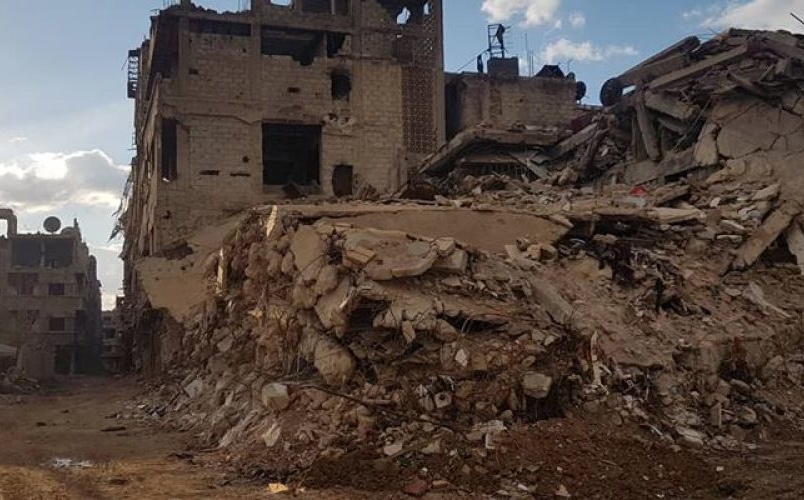The Yarmouk camp in southern Damascus, January 2019
In May 2018, opposition groups in the south of Syria’s capital Damascus capitulated after years of siege and bombardment. Some residents left on buses for other opposition areas; other remain.
The Assad regime declared a “reconciliation” deal.
A year later, those who stayed say “reconcilation” means continued repression, fear, and possible detention and torture.
Hassan Adal chose not to leave, hoping to preserve “the character of the area” against regime displacements of residents for demographic change and economic interests.
Adal was a negotiator in 2014 between the opposition and Assad regime during a siege which blocked humanitarian aid to southern Damascus. A settlement eventually lifted some restrictions on the Yarmouk camp and towns such as Babila, Yalda, and Beit Saham — until the Russian-backed regime offensive of April 2018.
See Syria Daily, May 2, 2018: Swap Deal for Removals Near Damascus and in Northwest
A year after the surrender, Adal tells Syria Direct:
“A huge number of young men have been drafted to the regime army. Everything that was promised in the settlement was a lie. There was no amnesty, no reconciliation. All of our demands remain unmet.”
Local sources say those who have money are making large pay-offs to regime officials to stay off wanted list. Those who can’t afford to bribe face detention and “horrific forms of torture”.
Rami Sayed, a photojournalist originally from southern Damascus and now in a refugee camp in the northwest, says he is struggling to find out from friends what is happening to them.
“A general lack of security, frequent arrests and detentions, proliferation of weapons, and legal anarchy in South Damascus has become the new normal,” he notes.
He adds ominously that those who negotiated the “reconciliation” with the regime have been arrested.
Brutal Restrictions
Before the Syrian uprising of March 2011, the Yarmouk camp was home to about 200,000 Palestinians.
Attacks and the siege, which caused scores of death from starvation, decimated the population.
Syria Op-Ed: “All That is Left of Yarmouk Is the Enduring Horror”
Now about 5,000 who are in southern Damascus are unable to return to Yarmouk and trapped by “brutal restrictions”, according to activists.
Fayez Abu Eed, director of London-based Action Group of Palestinians of Syria tells Syria Direct:
“If Palestinians want to leave Southern Damascus, the security forces must give them prior approval.
“Many Palestinians want to travel to the capital in order to go to school or university, but first we have to present documents to state security and prove our loyalty to the Assad regime.
“We must prove to them that we have supported the regime and have been on ‘good behavior’ throughout the civil war.”
Abu Eed says monthly rents of 25,000 to 40,000 lira mean a cost of living “out of reach for many Palestinian refugees”. They face further problems with inability to provide official documentation for landlords.
The Action Group said a number of displaced Palestinians were arrested on Sunday by regime security forces, who claimed the detainees had deserters from the Palestine Liberation Army.
Service in the PLA, effectively a branch of the regime’s army,is mandatory for Palestinians in Syria.
Among those arrested is Yasser Amayri, the coordinator of the UK-based Jafra Foundation for Relief of Palestinian Refugees, He and three other Jafra employees were seized in April.

